#hispanic culture
Text
YR fanfic pet peeves (and corrections): latin america edition
so. i was originally going to post this in january as a kind of "new year, new opportunity to learn about simon's hispanic heritage" kind of a thing, but life got busy, and then my computer died and i lost my original list, so i've had to reconstruct this from memory as best as i could. there may be some stuff missing, so perhaps i'll just keep adding to this post as missing/new points come to mind.
disclaimer 1: if you've included any of the points made here on any fanfic of yours, please don't take this as a call-out. this isn't intended to shame anyone, but rather as an educational opportunity. it's very rare that a latin american nationality that is not mexican or colombian or puerto rican is showcased in an international show, especially outside of the US, and it's given me such joy to have all of you lovely folks make the effort to be open to and research and understand the idiosyncrasies of simon's (and omar's) heritage because the rest of latin america tends to go overlooked in most other fandoms. so i don't intend to scold anyone with this. we can't all know everything about every other culture-- lord knows i don't know everything about sweden, but i want to be respectful to the country and its people and that is why i heavily research anything i don't know and ask people who do know when my research doesn't quite cover it and am open to corrections when even that falls short. i expect most of you come to write about simon's family background in good faith and also want to be respectful to his family's culture, and so i thought i might make things a bit easier for you all by putting the most common errors/misunderstandings i've seen in one handy post. but once again, it's not a call-out, i don't get offended by these things, and i'm in no way implying, if you've done any of these things in fic or in life, that you are a bad person. i understand people make mistakes when they don't know things.
disclaimer 2: i am not venezuelan myself. i was born and raised in the same general region of latin america, though, and i have venezuelan friends and have worked with venezuelan people and have visited venezuela. generally speaking, i feel their culture is very similar to mine (though our spanish is much closer to spanglish than theirs is, haha xD) and feel a deep kinship with them. but of course, i'm no native, and if you're venezuelan and catch anything here that you feel is incorrect, feel free to point it out and i'll add a correction in your name.
warning: this is very long. christ almighty. DX if you can't make it to the end, tl;dr-- feel free to ask if you have any questions or if anything isn't clear. my ask box/messages are always open.
1- "mijo." this is the only one that legit has caused me to click out of several fics/chapters, at least in the beginning, but i've learned to grin and bear it by now. it's not so much that it's wrong, per se, but rather it's more of a location issue. "mijo" is, to my ears, very much a mexican (or, if you stretch it, northern triangle) slang. it IS used sparingly in other countries, but rarely used unironically. instead, if you hear the term used in the caribbean region of latin america (which my country is part of, as is a large part of venezuela), it's almost always used… let's say sarcastically. for example, if your grown-ass adult friend is being a dumbass and doing something reckless, you might call out "oiga, mijo, se va a romper el cuello" ("hey, mijo, you're going to break your neck"). basically, it's a way of calling someone immature like a child. it doesn't have to be ENTIRELY unaffectionate (kinda like the way someone might call their significant other "idiot" or "dummy" but mean it endearingly. in fact, in colombia it's way more common for spouses to call each other "mijo/a" than it is for them to call their children that), but you can also use it with complete strangers-- like if someone cuts sharply into your lane while you're driving, you might yell at them "oiga, mijo, a donde le enseñaron a manejar, en un potrero?!" ("hey, mijo, where did you learn how to drive, in a horse paddock?!"). but even in these sarcastic/neggy cases, it's rare. and EVEN RARER to hear a mother call her children "mijo" or "mija" in this region. it's just not a thing. so when i read it in fanfic, it immediately takes me out of the story because it's so weird to me that linda would sound mexican-- it's a very distinctive accent, which carmen gloria 1000000% does not have. (plus, "mijo" in spanish is a type of birdseed. so it gave me a chuckle the first few times i read it in a fic because i always have that brief second of confusion where i go "why is linda calling simon birdseed?" before it clicks. xD i'm a dork.) it's much more likely that linda would just say "hijo" or "mi hijo," instead.
1b- the way you decide on whether to use "hijo" or "mi hijo" is important because "mi hijo" can sound overly formal in the modern context especially, much like it would in english. in fact, you can use the english version of it, "son" vs "my son" to guide you on which of the two to use. like for example, if linda were to say directly to simon "i love you, my son," she would sound oddly old-timey and anachronistic, so you would just use "son" ("hijo") in that case. whereas if she's talking about simon with someone else, for example saying "i told my son to be here on time," you'd be perfectly okay to use "mi hijo" in that sentence in spanish. it's very transferable in that case.
2- speaking of non-transferable, though, you can't use "cariño" in all instances you would use "sweetheart" or "sweetie." it really depends on the grammatical construction, and it can be tricky to get it right, but it depends on whether you're using it as a direct address or as an object. for example, if you're using it in place of someone's name-- say, a mother telling her child "te quiero, cariño" ("i love you, sweetheart/sweetie") is perfectly fine, because in that case, she could also say "te quiero, hijo" ("i love you, son") or "te quiero, simon" ("i love you, simon"). but if, say, simon says to wille "you're my sweetheart," you would not use "cariño" there; you'd go instead with some syrupy way to say "boyfriend," like "eres mi novio" or "eres mi enamorado" or even "eres mi amor," and if sara tells felice "you're a sweetheart," that would also not involve "cariño" at all. in addition, "cariño" is also very rarely used in plural; if linda is using a term of endearment for both her kids, or for a group of teens her kids' age, she would use a different term of endearment altogether: "hola, mis amores" ("hi, my loves"), "hola, bebés" ("hi, babies") or "hola, mis tesoros" ("hi, my treasures") among some examples. one exception is when you say "cariños míos" ("my sweethearts"), but very rarely the plural by itself. in fact, "cariño" is often slang for gift or present, especially in the diminutive-- for example, if you go to someone's celebratory party for some occassion (birthdays, graduations, baby showers, heck even christmas), you might hand them a small gift and go "te traje un cariñito" ("i brought you a small present"), and if it's more than one gift, or you're bringing gifts for several people, then you'd say "unos cariños" or "unos cariñitos" in the plural.
3- simon's skin is tan, not tanned. this… doesn't personally bug me as much because it's more of an english grammar issue, but i know people who might actually feel very offended if you get this one wrong with respect to them. "tan" is a color; a light shade of brown. "tanned" implies the original color of your skin has darkened with the sun. now, i'm sure simon can tan (lucky goat, says she whose skin burns even while indoors), but about 95% of the time "tanned" is used in YR fanfiction, it's used as a descriptor of the color of simon's skin as we see it on the show. that would imply his skin used to be lighter at some indeterminate before-time and has been darkened by the sun. this is incorrect; that is the natural color of simon's skin. so stick to "tan skin" instead (not tan PERSON, mind you. his SKIN is tan, he is not). and i would gently suggest that if you take away any single thing from this post, make it ESPECIALLY this point, as someone more sensitive than me might interpret this error as some kind of retroactive whitewashing. and i don't want anyone here to get in trouble for simply not knowing.
4- pabellón criollo is one dish, yes, but it's four different FOODS. it's not something a newbie would be able to make off of a recipe (i don't know how to make it and i've been eating it all my life), and it's not something that's likely to be taught in just one day. also, if you're bringing it to a dinner or a potluck, you're bringing four separate food containers, not just one.
4b- also, venezuelan food, for the most part, is not particularly spicy. you CAN make it spicy if you want, but traditionally, it is not. it's flavorful, maybe even saucy depending on the dish, but rarely spicy. i know the joke of white people being unable to handle spice is funny, but there's also plenty of us hispanic people who are equally terrible at it, because there's different levels of spice in the food from different regions of latin america. besides, as a friend of mine perfectly put: we are living in the 21st century now. if you can eat mild mexican food, you should be able to handle traditional venezuelan food just fine. and i'm pretty sure there's mexican food in sweden. plus, wille would probably be more used to international food-- not only does he have the means, but having traditional meals in foreign countries is kind of part of the job.
5- while i'm at it: simon is definitely half venezuelan. this is canon as of S2. there is no other place in the world where that dish is called pabellón. please keep that in mind when you're writing and researching.
5b- this, along with several of the points above, is important because it's a bit of diaspora trauma that whenever we venture outside of latin america and people learn we're latino, they immediately assume we're mexican, or that our culture and traditions are the same as those of mexican people. it happens often, and it's incredibly annoying. not that there's anything wrong with mexico or mexican people-- they're lovely, and their traditions and culture and food are fantastic-- but we are not them, and treating us like we are is reductive. the rest of latin america can be very different and incredibly diverse, and it can be dispiriting when people treat us like we're all the same. so that is why it is important when writing about simon, his family or his venezuelan roots, that you take care to actually research things as they are in venezuela, and not just pick the low-hanging fruit of latino facts you might've learned through pop cultural osmosis, which eight times out of ten will be mexican-only because most hispanic people in the US are mexican and the US exports its media all over the world. i've learned to just roll my eyes at it by now, but some people might actually feel offended or hurt, and i'm sure nobody here intends for that to happen.
6- although simon speaks spanish, neither he nor sara nor his mother nor any aspect of his mother's culture is spanish. "spanish" is what people from spain call themselves. people from spanish-speaking latin american countries are not spanish; we are hispanic, or latino/a/e. "latinx" is… let's call it controversial, at least outside of the US. most people born and raised in latin america don't like it; i personally don't get offended if people use it, but i don't use the term myself. also, you can say "latin food" or "latin music," but we usually don't refer to PEOPLE as latin, but rather latino/a/e. if in doubt, just use latin american or hispanic. they're also conveniently gender neutral.
EDIT: @andthatisnotfake also brought up a very important point: "if you spell it latinx, it makes it harder for screen readers to read (or so I've been told) and some people depend on those, so there's another reason to avoid it." (the unpronounceability of that term is at least part of the reason why hispanic people who live in latin america don't like it.)
6b- never use "the latino/a" on its own to refer to people. "latino/a/e" is an adjective, not a noun, so you would say "the latino boy" or "the latino man" but never just "the latino." kinda like it would be weird to point out the one japanese man in a room as "the japanese." there are some nationality/ethnic terms that just don't work as nouns in english.
7- spanish is not simon's one native language-- or at least not any more than swedish is. he grew up in a mixed-race household, speaking two different languages. it's pointless to call spanish his native language when comparing it to swedish. both are his native languages. also, while we're at this, wille is probably at least bilingual (i'm assuming he can speak at least english), although he only has one native language. it's hardly a competition between the two boys as to who's more of a polyglot.
7b- simon wouldn't take classes on the spanish language-- like to learn how to SPEAK the language-- since spanish is one of his native languages. he wouldn't take them at hillerska, nor in university, nor elsewhere. he wouldn't be allowed. you're literally not allowed to take classes on your native language, nor get credit for said classes. trust me, those would've been an easy extra 24 credits for me in college if that was a thing.
EDIT: have been made aware (thanks, @rightsogetthis and @plantbasedfish!) that at least in sweden and in finland one IS allowed to take classes of your non-swedish/finnish native language, in certain circumstances. i have to say, i'd be pissed if i were taking my french classes alongside a french native speaker, but hey, the system's the system, i guess. ;) so i've struck this one out.
8- dear god please don't use google translate for your spanish translations. listen, i'm not judging-- i do it with other languages, too, when i'm in a pinch. but google translate is literally The Worst (tm) so i always try to either check with someone, or stick to the stuff i already know is correct. seriously, you don't want to know the kinds of crazy stuff GT can spit out that people actually put out in the real world; some of them are quite hilarious. if you're unsure, my ask box/messages are always open and i looooove helping people with this kind of thing, hispanic language and cultural stuff. i know it seems like i'm hardly around, but i do check my messages. don't be shy, even if it's something really small.
PS: while i'm talking pet peeves, malin is wille's bodyguard, not his butler. she's nice enough to attend to him at hillerska because there's no other palace staff around and she's literally stationed outside his door, but she wouldn't do that in the actual palace. there's other staff for that. she wouldn't even guard him at the palace, i don't think, because the royal palaces in sweden are guarded by the royal guard, not SÄPO. if anything, malin might spend the time while wille is in the palace grounds at a gatehouse (like in YR 2x03 and onwards) or at some kind of security office in the palace, and then get called whenever wille needs to go anywhere. she wouldn't be giving wille messages from the queen or walking guests to wille's room or anything like that. that's not her job. (sorry, i had to get that off my chest, lol.)
#young royals#young royals netflix#netflix#simon eriksson#sara eriksson#linda eriksson#omar rudberg#carmen gloria perez#latin america#latino#hispanic#latin american culture#latin culture#latino culture#hispanic culture#spanish language#i hope this is helpful#if not feel free to ignore lol
251 notes
·
View notes
Text

Ballet Hispánico dancers, 1970s 🌹💃🏽🌹💃🏽🌹
📸: Kenn Duncan
#Ballet Hispánico#dancers#1970s style#1970s fashion#1970s vintage#1970s#70s style#70s fashion#70s women#70s vintage#70s#vintage 70s#decade: 1970s#vintage style#vintage fashion#vintage women#vintage beauties#latina#hispanic women#latin beauties#hispanics#puerto rican women#puerto rican girls#hispanic beauties#latin dancers#latina beauties#latin culture#hispanic culture#latin girls#puerto rican
35 notes
·
View notes
Text
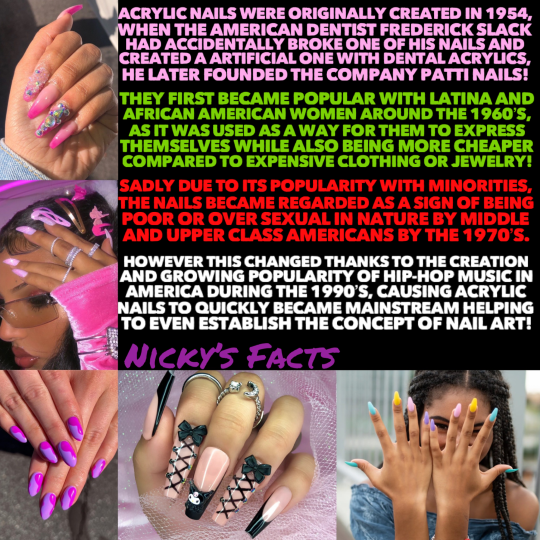
Acrylic nails are and will always be a beautiful example of latino and black femininity!
💅🏼💜💅🏿
#history#acrylic nails#united states#latina#african american women#womens history#nail art#rap music#black girl magic#hispanic culture#black history#femininity#girly girl#fake nails#black culture#american history#baddie#girly things#bimbocore#black luxury#boujee#latino history#black coquette#hispanic coquette#pretty nails#soft girl#nickys facts
126 notes
·
View notes
Text
#Hispanic#hispanic culture#rice#poll time#polls#random polls#lgbt#queer#trans#lgbtq+#silly#food#silliness#sillyposting
22 notes
·
View notes
Text




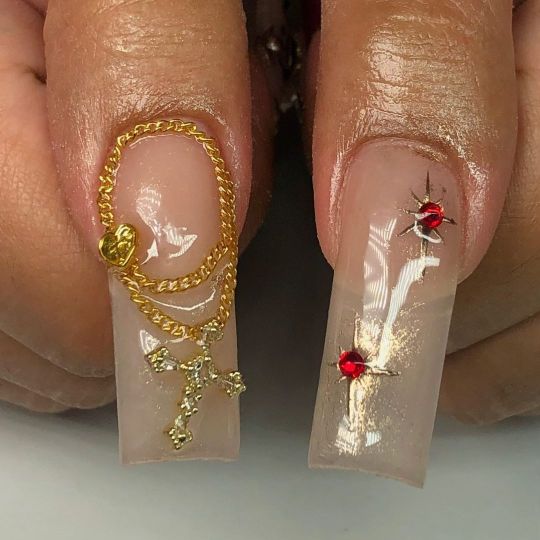

#been a while#nails & inspo#nails and inspo#cute#cute nails#beauty#nails#melanin#manicure#mani#nail blog#hispanics#hispanic culture#cultura hispaño#cultura#catholique#catholiscism#hearts#@nailedbyvalz#texas#dallas
100 notes
·
View notes
Text

Feliz Dia de los Muertos!
November 2 is the date in the festival of remembrance where the deceased adults are commemorated. Here is a digital ofrenda (altar with offerings) for my late Dad, Peter.
Ofrendas are a beautiful way to remember people who have passed away by displaying symbols of their identity in life along with candles and colourful orange marigold flowers of the Cempasuchil (Tagetes erecta) variety. Dia de los Muertos is a popular festival in the USA and Mexico with both private and public celebrations to remember ancient ancestors, famous individuals, and family members as well as to raise awareness about the plight of groups like refugees and the homeless. The occasion is marked with richly decorated ofrendas in homes and public places like museums and libraries along with parades and festivals with live music and dance. In the USA, it is an opportunity to celebrate Mexican culture. The holiday is often called Dia de los Difuntos in the rest of the Spanish speaking world and it is not as colourful and cheerful as in the USA and Mexico.
My Dad's ofrenda shows his career as a geologist in the photo of him with fossil-filled sedimentary rocks at Kimmeridge Bay in Dorset, UK. My late Dad had an incredible knowledge of geology - he could simply look at a landscape and tell you the whole history of how it was formed by the physical clues in the rocks and geological features. He loved cycling so naturally a model bike is included, along with a stack of books to show his passion for reading and learning. His lifelong hobby of piano playing and his appreciation of classical music is shown with the model piano and books of music notes. Fruit was his favourite food and probably helped him live a long and healthy life. Of course, his Danish culture was an important part of his identity so I've included a Danish flag.
Warm wishes for everyone remembering their friends, family, and ancestors today!
My digital ofrenda features AI generated art made with DALL E as well as digital edits created in Canva.
#katia_plantscientist #ofrenda #diadelosmuertos #diadelosdifuntos #mexicanculture #inmemory #dad #lovingmemories #aiart #dalle #digitalart
#dia de los muertos#dia de los difuntos#day of the dead#ofrenda#altar#hispanic culture#mexican culture#dad#geologist#denmark#in loving memory#family#digital art#ai artwork#dall e ai
10 notes
·
View notes
Text
Seeing a lot of TikTok misinformation on 12 Uvas (12 Grapes on New Years).
While the tradition varies from country to country, there are a few general rules to follow that I know people from Spain and Latin America partake in. I'll list them here.
Rule 1)
You can't wear an old red thing, it has to be new - for the new year.
Rule 2)
The red thing has to be underwear and other red things can be added to this but you must have the new red underwear for the tradition.
Rule 3)
Non-Spanish/Non-Hispanic/Non-Latinos shouldn't be changing or altering the tradition as an outsider! You can still partake in it but please don't change our tradition into something different (which is why I'm making this post).
Rule 4)
Under the table is optional, but if you are, go under at 11:58pm, eat the grapes at 00:00-00:01. Exit from under the table as soon as you're done.
Rule 5)
No 5 second rule. No dropping the grapes. If they fall, it ruins it. To help avoid this, use a bowl or a skewer.
Rule 6)
I don't know who made some people ask if it would work for their race as any minority but it works for all races provided you do the tradition respectfully and correctly (as outsiders to it, insiders may have their own altered traditions based on family and place).
Rule 7)
No, you don't need a specific grape color. BUT I recommend using red/purple grapes as it's closer to the red underwear tradition.
Rule 8)
You must eat all the grapes before the clock finishes chiming the New Year in. If you don't, it simply means you've missed out on extra luck this year.
Rule 9)
Whole grapes, not slices. Be careful to avoid choking though! Make sure this tradition has at least one other person around you for safety reasons.
Rule 10)
Enjoy partaking in our culture during New Year! Anyone can participate and I encourage anyone who would like to, however please do it correctly and don't change our tradition.
¡Another thing to note is the Red Underwear is a separate tradition to 12 Uvas! ¡Both traditions originate in Spanish culture and spread throughout Latin America!
Próspero Año Nuevo 🪅
#mexican culture#mexican#hispanic#hispanic culture#12 grapes#12 uvas#doce uvas#twelve grapes#spanish culture#culture#new year#new years#año nuevo#red underwear#tiktok#red symbolism is luck#new symbol for the new year#12 grapes for 12 months#cultural exchange#cultural appreciation#sharing culture#spain#latino#latine#latina#españa#mexico#méxico#latin america#noche vieja
21 notes
·
View notes
Text
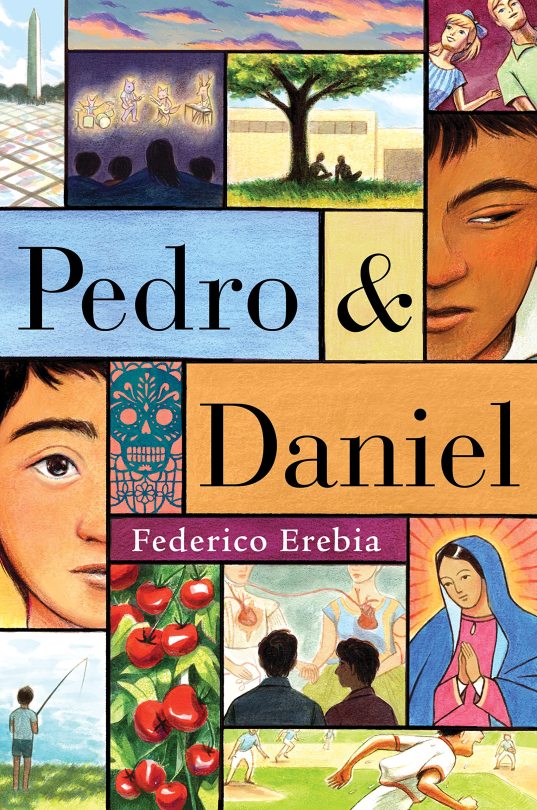
#book tumblr#booksgiving#book review#levine querido#gay author#gift ideas#christmas gift#graphic memoir#hispanic culture#homophobia
6 notes
·
View notes
Text

11 notes
·
View notes
Text

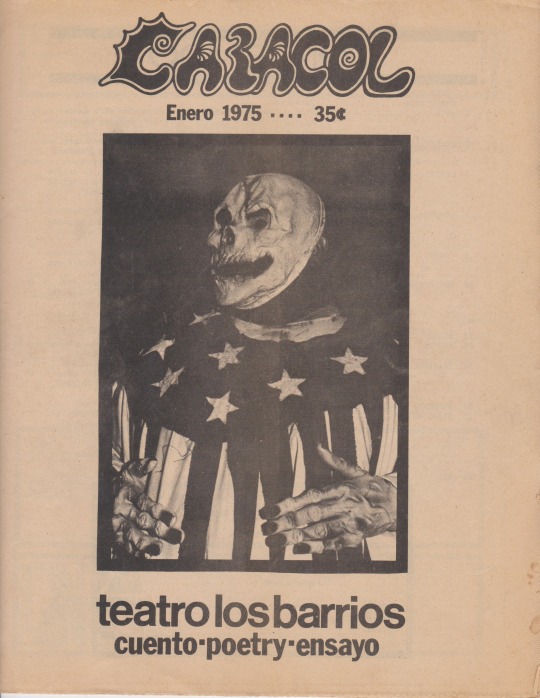
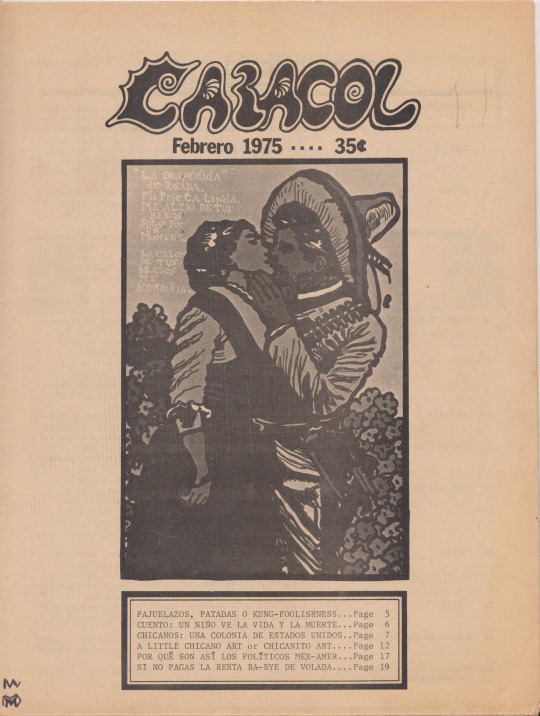
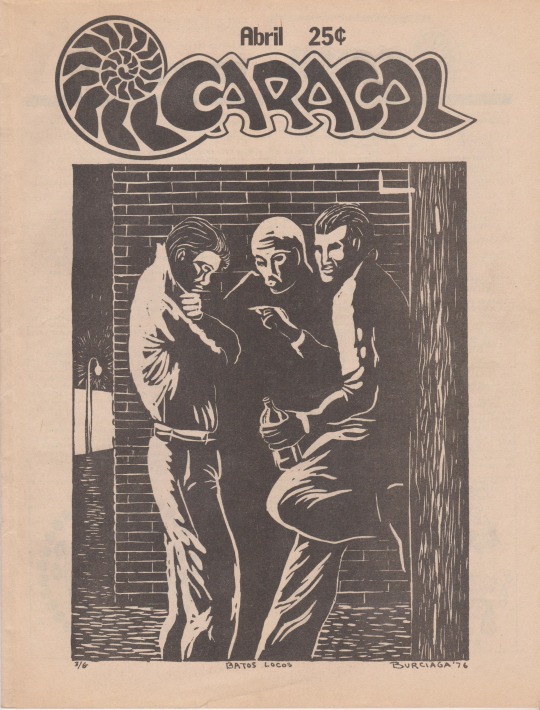
Some covers from CARACOL, a San Antonio-based bilingual magazine from the 70s. Mostly poetry, essays, some neat woodcut art. Covers scanned from my personal collection.
#magazines#san antonio#texas#caracol#woodcut art#mexican-american culture#latino culture#hispanic culture#1975#1977
2 notes
·
View notes
Text
So, I'm watching Brooklyn 99 with a close friend and...
What started as very basic headcanons about all of the squad evolved into quite serious discussions about racism and sexism, and the links that they have.
Said friend comes a wide spread family of travellers and mentioned that they head canon that, like many of their family and close friends, they think that Rosa Diaz and her father are Indigenous (Native American).
We know her mother is Hispanic, but after a lot of research to make sure we didn't stereotype or say anything offensive, we think that her father is Indigenous and, as a result, Rosa is half Indigenous and half Hispanic.
Does anyone else agree or think this? Because we can't find anything related anywhere else. So do we have a point or are we just stupid?
Thank you!!
#brooklyn 99#rosa diaz#b99#rosa b99#native american#indigenous#indigineous people#hispanic culture#indigineous culture#headcanon#theories
43 notes
·
View notes
Text


#hispanic#hispanic culture#spanish memes#hispanic meme#mexican#mexican memes#food memes#candy#alternate language meme#it's been several months and I still don't know how to properly tag shit#I'm convinced there's no right way at this point#I have seen some FUCKED shit in the tags#y'all worry me sometimes#duvalín#duvalin#food meme
5 notes
·
View notes
Text

Day of the Dead (Día de Muertos)
The Day of the Dead (Spanish: el Día de Muertos or el Día de los Muertos) is a holiday traditionally celebrated on November 1 and 2, though other days, such as October 31 or November 6, may be included depending on the locality. It is widely observed in Mexico, where it largely developed, and is also observed in other places, especially by people of Mexican heritage. Although related to the simultaneous Christian remembrances for Hallowtide, it has a much less solemn tone and is portrayed as a holiday of joyful celebration rather than mourning. Some argue that there are Indigenous Mexican or ancient Aztec influences that account for the custom, and it has become a way to remember those forebears of Mexican culture. The multi-day holiday involves family and friends gathering to pay respects and to remember friends and family members who have died. These celebrations can take a humorous tone, as celebrants remember funny events and anecdotes about the departed
#baron samedi#haiti#day of the dead#mexico#dias de los muertos#holidays#food and drinks#celebration#souls#reunion#november#heavens gate#life#hispanic culture#face painting#makeup#disguise#voodoo
1 note
·
View note
Note
do you have any book recs that have a latine main character?
Most books I read with Latine main characters are in Spanish or, if translated to English, are hard to find in free pdf, so you'd have to buy them. But... Since it's Halloween...
Here are some or my favorite Neo-ghotic Latine authors and somw other books.
⠀
1. OUR SHARE OF NIGHT
“ Juan Peterson was saved from his sickness by a rich Argentinian family when he was just a kid. In return, he became the medium who contacted the demon figure of their cult, and ends up marrying one of the family's daughters, Rosario.
Years after, Rosario dies and Juan suspects her family (the cult) killed her for hiding the psychic abilities of their son, Gaspar. Juan runs against time to try and protect them both, because if they knew the kid has the abilities of his father, they'd kill Juan and replace him with Gaspar. ”
Unsettling enough to not be read at night, but beautifully written, with a well executed plot. It is an interesting mix of queer subplots, South American history of the last century, Latine ghost stories to haunt you for weeks and characters (and scenes) you won't be able to get out of your head.
I have the pdf in Spanish, but the English translation is getting published next year! Please buy it if you can <3
⠀
Author: Mariana Enríquez. Argentina.
Link to buy it in English. Pdf in Spanish.
⠀
( see more book recs under the cut )
⠀
2. JAWBONE
“ Fernanda Montero Oliva, a high class student of a prestigious Catholic high school for girls, wakes up one morning to find out she's been kidnapped by Clara, her Literature teacher, who's been tormented by Fernanda and her group of friends from months now.
But the story of such group of girls goes beyond it.
They've also created the cult of the Crocodile God, the White God. The leader was Fernanda best friend, Annelise, a tumultuous figure that absorbed Fernanda whole with her obsession with fear. That's how the nightmare started.
With Annelise and Fernanda both. ”
Honestly I'm still trying to figure out how to feel about this story. It made me feel like –like when I watched Hannibal, like I was running a fever.
The book explores the nature of power in mother-daughter dynamics, the nature of violence between teenage girls, the nature of terror and fear, how women are treated and seen in Latam and finally, the relationship between the female figure and the monstrous.
Cw for– genuinely, everything. This is not a light read.
Author: Mónica Ojeda. Ecuador.
Pdf in English. Pdf in Spanish.
⠀
3. CEMETERY BOYS
“ Yadriel is queer, trans, Latino, and a brujo (witch).
Unfortunately, his family does not recognize him as a man, which has serious effects on his witching ability. Along with his cousin and best friend, Maritza, Yadriel attempts to summon the ghost of his murdered cousin to prove himself.
Instead, he summons Julian Diaz, a boy from Yadriel's school who does not remember how he died and is not ready to move on. ”
I haven't read it yet, so I can't day much. Still, one of my friends is obsessed with it and I trust my friend's taste, so this must be amazing. To tell a queer and trans story in a Latine setting in United States... And put witchcraft on it...
This is by far the lighter read of this list. At least it won't break your brain and leave you with traumas, something that could very much happen with Jawbond or Our Share Of Night.
Author: Aiden Thomas. United States.
Pdf in English. Pdf in Spanish.
⠀
4. This World Does Not Belong to Us
“ Lucas was just a child when his father sold him to another farmer as a laborer. Years later, Lucas returns, full of resentment and burning for revenge. ”
Lyrical prose, I haven't read it yet but I've been waiting for the chance. It talks a little about change, the way some insects experience it, and how it relates to us humans as we grow old
Author: Natalia García Freire (Ecuador).
Pdf in English. Pdf in Spanish.
⠀
And here are some more I'll only mention, because I have so many Latine spooky books recs for October:
Fever Dream (Distancia de Rescate)
A mother and her daughter move to a country town, but things start getting scary when the town start getting sicker and sicker.
There's a Netflix adaptation, but for obvious reasons the book is better.
by Samanta Schweblin (Argentina).
⠀
Malasangre (Badblood).
Back at the first half of 1900, a young girl turns into a vampire due contamination in his father's blood for sleeping with mistresses. She tries to survive the heavy political and social context of Venezuela back on those years, with the help of a queer man and her own mind.
There's no English adaptation, sadly :(
by Michelle Roche Rodriguez (Venezuela).
#Angel's asks#Latine books#Latine culture#Hispanic culture#Hispanic Heritage Month#Book recs#Latine book recs#Angel's book recs
7 notes
·
View notes
Text
Searching for non white Shows and movie to watch. Please feel free to recommend me stuff!
Bonus if it has lgbtqia+ representation that isn't queerbaiting. <3


#non white#black culture#hispanic culture#non white media#asian culture#african movies#asian movies#poc#black#please recommend#searching for new media#that is not predominantly white#if you're not white and can recommend a mainly white show or movie bevause it still has good representation that is fine as well!#moonlight#thai drama#black history#asian drama#asian history#african history#i hope people will see this lol#im bad with good tags#please reblog
3 notes
·
View notes
Photo
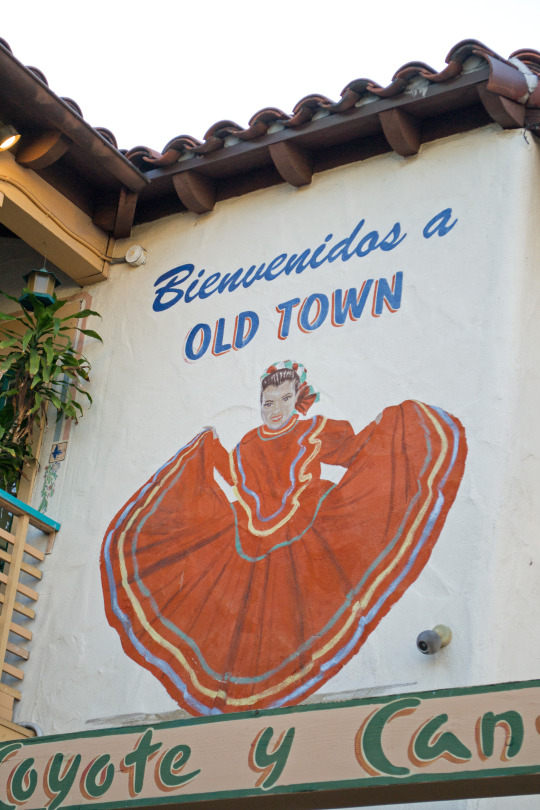
Feliz Cinco de Mayo!
Photo: Old Town San Diego, California
#san diego#california#mexican culture#cinco de mayo#san diego old town#west coast#california coast#ca#the golden state#southern california#travel#tourism#adventure#explore#history#hispanic culture
12 notes
·
View notes